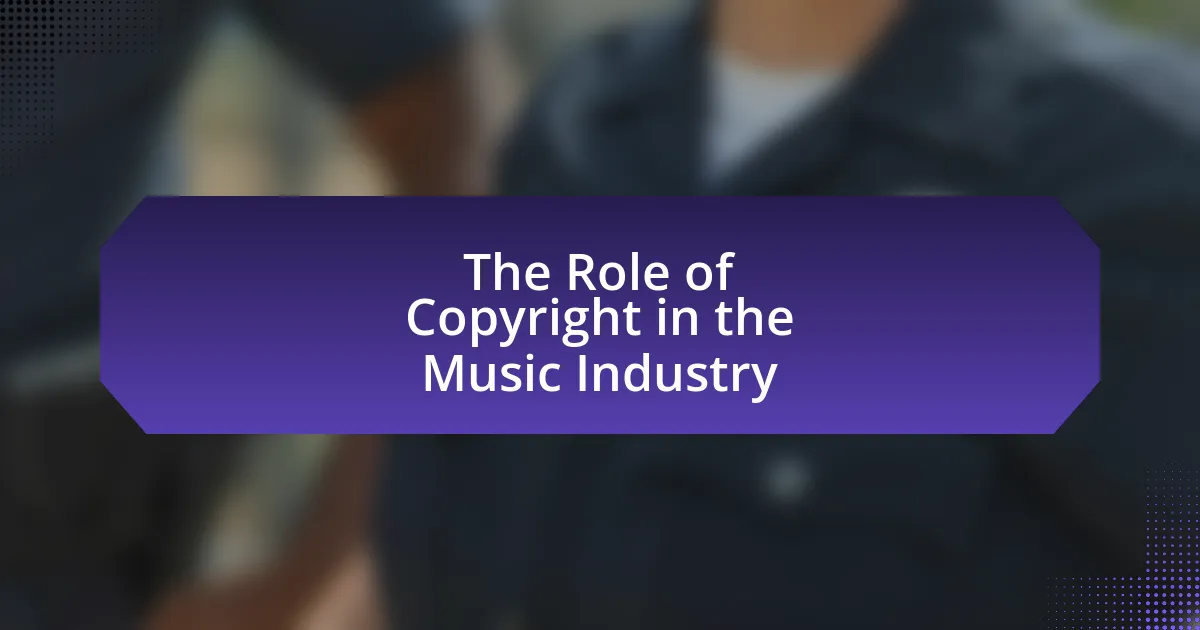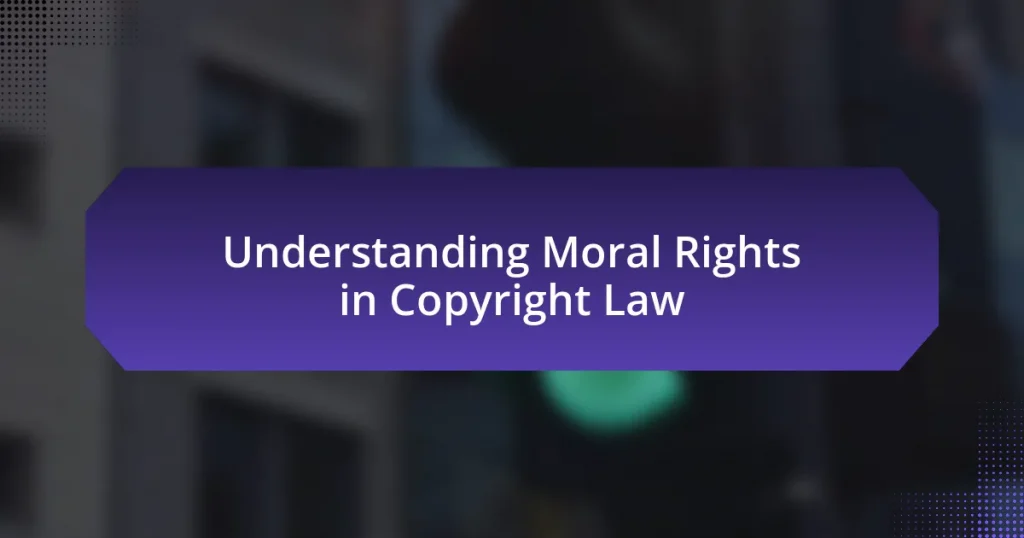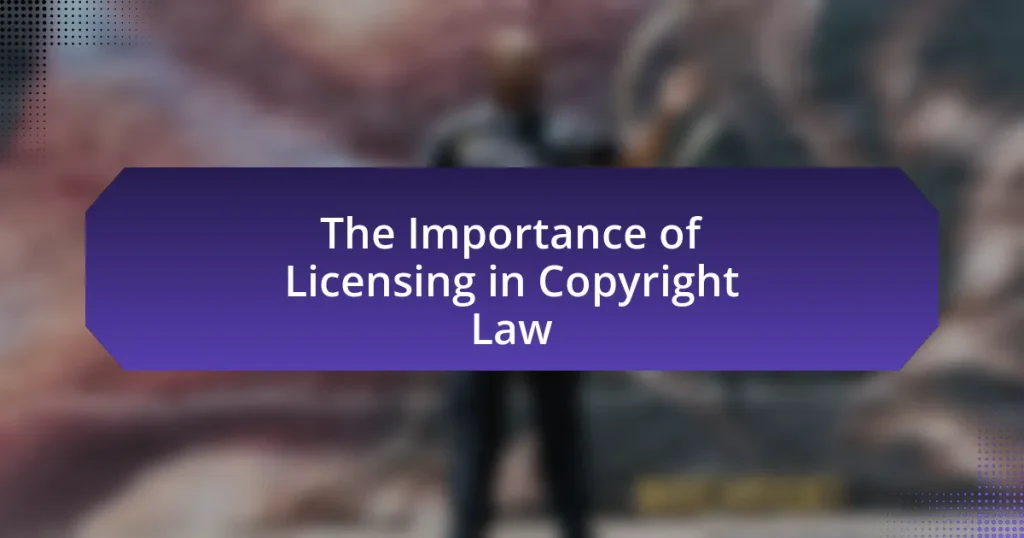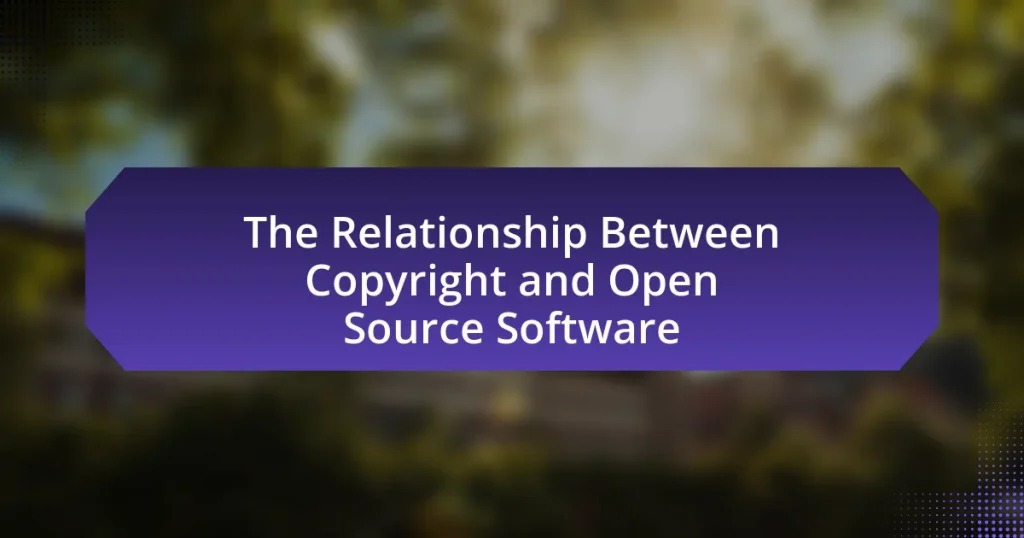Copyright is a fundamental legal framework in the music industry that protects the rights of creators, including musicians, songwriters, and producers, ensuring they receive compensation for their work. This article explores how copyright safeguards musical works, the types of works eligible for protection, and the registration process. It also examines the importance of copyright for artists’ financial success, the challenges they face regarding infringement, and the impact of digital streaming on copyright practices. Additionally, the article discusses current trends in copyright law, international implications for global music distribution, and best practices for artists to protect their rights effectively.

What is the Role of Copyright in the Music Industry?
Copyright plays a crucial role in the music industry by protecting the rights of creators and ensuring they receive compensation for their work. This legal framework grants musicians, songwriters, and producers exclusive rights to reproduce, distribute, and publicly perform their music, thereby incentivizing creativity and investment in new works. According to the U.S. Copyright Office, copyright protection allows creators to control how their music is used and to earn royalties from sales, streaming, and licensing, which are essential for sustaining their careers. In 2020, the global recorded music industry generated approximately $21.6 billion, highlighting the economic significance of copyright in facilitating revenue streams for artists and the industry as a whole.
How does copyright protect musical works?
Copyright protects musical works by granting creators exclusive rights to reproduce, distribute, perform, and display their compositions. This legal framework ensures that the original authors receive recognition and financial compensation for their work, thereby incentivizing creativity and innovation in the music industry. For instance, under the U.S. Copyright Act, musical works are automatically protected upon creation, allowing composers to control how their music is used and preventing unauthorized exploitation. This protection is reinforced by the ability to pursue legal action against infringers, which serves as a deterrent against copyright violations.
What types of musical works are eligible for copyright protection?
Musical works eligible for copyright protection include original compositions, lyrics, and sound recordings. Original compositions refer to the melody and harmony created by the composer, while lyrics are the textual elements of a song. Sound recordings protect the specific performance of a musical work, capturing the unique interpretation by artists. Copyright law ensures that these works are protected from unauthorized use, allowing creators to control their distribution and reproduction. This protection is established under the Copyright Act of 1976 in the United States, which outlines the rights granted to authors of musical works.
How is copyright registration achieved in the music industry?
Copyright registration in the music industry is achieved by submitting a completed application form, along with a copy of the work and the required fee, to the U.S. Copyright Office. This process establishes legal ownership and provides the creator with the ability to enforce their rights. The U.S. Copyright Office requires that the application includes specific information such as the title of the work, the name of the author, and the date of creation. Once the application is processed, the copyright is officially registered, granting the creator exclusive rights to reproduce, distribute, and perform the work. According to the U.S. Copyright Office, registration is not mandatory but is highly recommended as it provides legal advantages, including the ability to sue for statutory damages and attorney’s fees in case of infringement.
Why is copyright important for music creators?
Copyright is important for music creators because it grants them exclusive rights to their original works, allowing them to control how their music is used and distributed. This legal protection ensures that creators can monetize their efforts, receive royalties, and prevent unauthorized use or reproduction of their music. According to the U.S. Copyright Office, copyright protection incentivizes creativity by ensuring that artists can benefit financially from their work, which is crucial in an industry where music is easily shared and copied.
How does copyright impact the financial success of musicians?
Copyright significantly impacts the financial success of musicians by providing legal protection for their creative works, which enables them to monetize their music effectively. When musicians hold copyright over their songs, they can control how their music is used, ensuring they receive royalties from sales, streaming, and licensing. For instance, according to the U.S. Copyright Office, musicians can earn substantial income through performance royalties, mechanical royalties, and synchronization fees, which are all contingent on copyright ownership. This legal framework not only incentivizes creativity but also secures a revenue stream that is essential for the sustainability of a musician’s career.
What rights do copyright holders have over their music?
Copyright holders have exclusive rights over their music, which include the right to reproduce, distribute, perform, and create derivative works. These rights enable copyright holders to control how their music is used and to receive compensation for its use. For instance, under the U.S. Copyright Act, copyright holders can license their music for commercial use, ensuring they earn royalties from sales, streaming, and public performances. This legal framework protects the financial interests of artists and songwriters, allowing them to benefit from their creative efforts.
What challenges do artists face regarding copyright?
Artists face significant challenges regarding copyright, primarily due to the complexities of copyright law and the ease of digital content reproduction. The ambiguity in copyright ownership, especially in collaborative works, often leads to disputes over rights and revenue sharing. Additionally, the rapid evolution of technology complicates enforcement, as unauthorized use of music can occur across various platforms without proper attribution or compensation. According to a 2021 report by the International Federation of the Phonographic Industry, 70% of artists reported difficulties in protecting their work from piracy, highlighting the pervasive issue of copyright infringement in the digital age.
How do copyright infringements occur in the music industry?
Copyright infringements in the music industry occur when individuals or entities use copyrighted music without permission from the copyright holder. This can happen through unauthorized reproduction, distribution, or public performance of a song. For instance, when a song is sampled or covered without obtaining the necessary licenses, it constitutes infringement. According to the U.S. Copyright Office, music is protected under copyright law, which grants exclusive rights to the creators, and violations can lead to legal consequences. In 2020, the music industry reported losses exceeding $1 billion due to copyright infringement, highlighting the significant impact of unauthorized use on artists and the industry as a whole.
What are the consequences of copyright violations for artists?
Copyright violations for artists can lead to significant legal and financial consequences. Artists may face lawsuits, resulting in costly legal fees and potential damages awarded to the copyright holder. For instance, a study by the U.S. Copyright Office indicates that copyright infringement can lead to statutory damages ranging from $750 to $30,000 per work, depending on the severity of the violation. Additionally, artists may suffer reputational harm, which can impact their career opportunities and relationships within the industry. This underscores the importance of adhering to copyright laws to protect both their creative works and professional standing.
How does copyright influence music distribution and consumption?
Copyright significantly influences music distribution and consumption by establishing legal protections for creators, which in turn affects how music is shared and monetized. Copyright laws grant artists exclusive rights to their works, allowing them to control reproduction, distribution, and public performance. This legal framework ensures that artists receive compensation for their creations, thereby incentivizing the production of new music. For instance, the U.S. Copyright Act of 1976 provides a foundation for artists to license their music, leading to revenue streams from sales, streaming services, and licensing agreements. As a result, copyright not only shapes the economic landscape of the music industry but also impacts consumer access to music, as unauthorized distribution can lead to legal repercussions for both distributors and consumers.
What role does copyright play in licensing agreements?
Copyright serves as the legal foundation for licensing agreements by granting creators exclusive rights to their original works, such as music compositions and recordings. This exclusivity allows copyright holders to control how their works are used, reproduced, and distributed, which is essential for negotiating licensing terms. For instance, when a music artist licenses a song for use in a film, the licensing agreement is based on the copyright held by the artist, ensuring they receive compensation and maintain control over their intellectual property. The U.S. Copyright Act of 1976 establishes these rights, reinforcing the importance of copyright in facilitating fair and legal use of creative works within licensing agreements.
How do licensing agreements benefit both artists and businesses?
Licensing agreements benefit both artists and businesses by providing a structured framework for the use of creative works, ensuring that artists receive compensation while businesses gain access to valuable content. Artists benefit financially through royalties and exposure, as licensing allows their work to reach wider audiences without the need for direct sales. For instance, a study by the International Confederation of Societies of Authors and Composers (CISAC) reported that licensing revenues for creators increased by 8.5% in 2020, highlighting the financial advantages for artists. Businesses, on the other hand, enhance their products or services by incorporating popular music or art, which can lead to increased customer engagement and sales. This symbiotic relationship fosters a sustainable ecosystem where both parties thrive, supported by the legal protections that copyright provides.
What are the different types of music licenses available?
The different types of music licenses available include mechanical licenses, synchronization licenses, performance licenses, and master use licenses. Mechanical licenses allow for the reproduction of a song in physical formats, such as CDs or vinyl, and are typically obtained through organizations like the Harry Fox Agency. Synchronization licenses are required for pairing music with visual media, such as films or commercials, and are negotiated directly with the copyright holder. Performance licenses grant permission to publicly perform a song, which is usually managed by performance rights organizations like ASCAP or BMI. Master use licenses are needed to use a specific recording of a song in a project, and these are also negotiated with the rights holder of the recording. Each type of license serves a distinct purpose in the music industry, ensuring that creators are compensated for their work.
What are the current trends in copyright law affecting the music industry?
Current trends in copyright law affecting the music industry include the rise of digital rights management and the push for more equitable compensation for artists. Digital platforms are increasingly adopting stricter copyright enforcement measures to combat piracy and unauthorized use of music, which has led to a greater emphasis on licensing agreements. Additionally, legislative efforts, such as the Music Modernization Act in the United States, aim to ensure that songwriters and performers receive fair royalties from streaming services. These trends reflect a broader movement towards adapting copyright laws to the realities of digital distribution and the need for fair compensation in an evolving music landscape.
How is digital streaming changing copyright practices?
Digital streaming is fundamentally altering copyright practices by shifting the focus from physical sales to licensing agreements. This transition has led to the emergence of new revenue models, where artists and rights holders earn income through streaming platforms rather than traditional album sales. For instance, in 2020, the Recording Industry Association of America reported that streaming accounted for 83% of the music industry’s revenue, highlighting the dominance of this model. Consequently, copyright laws are adapting to address issues such as fair compensation, user-generated content, and the enforcement of rights in a digital environment, necessitating ongoing revisions to existing legislation to protect creators effectively.
What impact do international copyright laws have on global music distribution?
International copyright laws significantly influence global music distribution by establishing a framework that protects the rights of creators across borders. These laws ensure that artists and producers receive compensation for their work when it is distributed internationally, which incentivizes the creation of new music. For instance, the Berne Convention, an international agreement, mandates that member countries recognize the copyright of works from other member states, facilitating smoother distribution and licensing processes. This legal protection helps to combat piracy and unauthorized use, thereby promoting a fair marketplace for music. Additionally, the World Intellectual Property Organization (WIPO) plays a crucial role in harmonizing copyright laws, which further enhances the ability of music to reach global audiences while safeguarding the interests of creators.
What best practices should artists follow to protect their copyright?
Artists should register their works with the U.S. Copyright Office to establish legal ownership and facilitate enforcement. This registration provides a public record of the copyright and is necessary for filing a lawsuit for infringement. Additionally, artists should use copyright notices on their works, which serve as a warning to potential infringers and can deter unauthorized use. Keeping detailed records of the creation process, including drafts and correspondence, can also help prove ownership in disputes. Furthermore, artists should consider using digital rights management (DRM) tools to protect their music online. According to the U.S. Copyright Office, registered works are eligible for statutory damages and attorney’s fees in infringement cases, reinforcing the importance of these practices.



